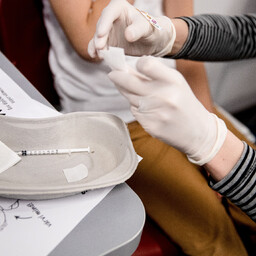The Ministry of Social Affairs has prepared a draft for the Infectious Disease Prevention and Control Act (NETS). This also concerns children's vaccination. In Estonia, the number of vaccinated children has been declining for over a decade. If this continues, the risk of disease outbreaks and epidemics will increase.
The current law does not have clear rules regarding the vaccination of minors in schools. This creates confusion. "Such a situation does not promote the best protection of the child's interests and opinions regarding their health. Additionally, differing opinions between the child and parent regarding vaccination can lead to conflicts," the document states. The document is not yet a draft law, so discussions and analyses await.
The ministry wants to improve the situation. They aim to clarify the tasks, rights, and obligations of school nurses in vaccination. During school vaccination, the school nurse should have the right to assess the child's decision-making capacity.
Social Minister Karmen Joller said in the Vikerraadio program "Uudis+" that school nurses already have this right. However, the current regulation does not explicitly state this, so the law needs to be made clearer. "When a healthcare worker advises a child, they must take age into account. You don't explain to a two-year-old the same way as to a seven-, eight-, or 16-17-year-old," she said. "If the healthcare worker finds that the child is capable of making decisions, understands why a vaccine, painkiller, or other medication is needed, then the child must understand what it is for, what the risks and benefits are, and the child can decide for themselves."
According to the document, children who wish to be vaccinated but whose parents do not allow it are currently in an unequal situation. For other health decisions, Estonia follows the principle that children's consent and opinions must be asked and considered according to their level of development. If the child is not capable of making a decision, the parent decides for them. However, if the legal representative's decision clearly harms the child's interests, doctors cannot follow it.
An exception is the vaccination of children in school. In this case, the rule of considering decision-making capacity is not applied, and parental consent is always required. The ministry must now clarify the rights and obligations of the parties to better implement the immunization program.
"Another change we would like to make is that the school nurse must ask for parental consent to vaccinate the child," said Joller. She noted that for other procedures, such as administering painkillers, parental consent is not required. However, expressing consent for vaccines can be unnecessarily complicated.
"Sometimes it's done via email, sometimes on paper. I am also one of those parents who managed to give consent at the last moment. It was so inconvenient: you have to download a file, I couldn't fill it out on my phone, I had to sign the PDF on the computer and send it back. With a fast-paced life, it was a very lengthy process," said Joller.
It is also not excluded that a parent, while emptying their child's school bag in the spring, finds a crumpled paper that turns out to be a vaccination consent form. "We have had parents who say that my child was not vaccinated because I couldn't sign. So let's do it the other way around, where the minority who do not want to vaccinate their child gives the signature," said the social minister.
The first vaccine that children receive at school age is for measles and mumps at the age of 13. According to Joller, this is an adequate age for decision-making, but each child must be considered individually. Parents could, according to Joller, receive a notification stating that vaccinations will take place at school during the upcoming week.
According to WHO recommendations, to prevent the spread of serious diseases, vaccination coverage among children should be 95 percent, and for certain diseases, 90 percent. In Estonia, as of 2023, over 27 percent of young people were not revaccinated against measles, mumps, and rubella. Among two-year-olds, the vaccination rate for these diseases had fallen to 84 percent at the same time.

